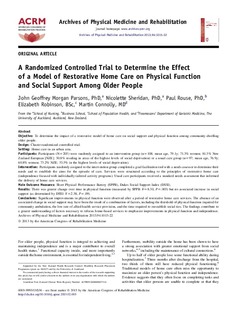| dc.contributor.author | Parsons, J.G. | |
| dc.contributor.author | Sheridan, N. | |
| dc.contributor.author | Rouse, P. | |
| dc.contributor.author | Robinson, E. | |
| dc.contributor.author | Connolly, M. | |
| dc.date.accessioned | 2017-06-07T12:37:51Z | |
| dc.date.available | 2017-06-07T12:37:51Z | |
| dc.date.issued | 2013 | |
| dc.identifier.citation | Parsons, J.G., Sheridan, N., Rouse, P., Robinson, E. & Connolly, M. (2013) A randomized controlled trial to determine the effect of a model of restorative home care on physical function and social support among older people. Arch Phys Med Rehabil, 94(6), s. 1015-1022. | |
| dc.identifier.uri | http://hdl.handle.net/11250/2444973 | |
| dc.description | RCT om effekt av hverdagsrehabilitering. | |
| dc.description.abstract | Objective: to determine the impact of a restorative model of home care on social support and physical function among community-dwelling older people. Design: Cluster-randomized controlled trial. Setting: home care in an urban area. Participants: participants (NZ205) were randomly assigned to an intervention group (nZ108; mean age, 79.1y; 71.3% women; 81.5% New Zealand European [NZE]; 50.8% residing in areas of the highest levels of social deprivation) or a usual care group (nZ97; mean age, 76.9y; 60.8% women; 73.2% NZE; 53.5% in the highest levels of social deprivation). Intervention: participants randomly assigned to the intervention group completed a goal facilitation tool with a needs assessor to determine their needs and to establish the aims for the episode of care. Services were structured according to the principles of restorative home care (independence focused with individually tailored activity programs). Usual care participants received a standard needs assessment that informed the delivery of home care services. Main Outcome Measures: Short Physical Performance Battery (SPPB), Dukes Social Support Index (DSSI). Results: there was greater change over time in physical function (measured by SPPB: FZ8.30, PZ.003) but no associated increase in social support (as determined by DSSI: FZ2.58, PZ.09). Conclusions: significant improvements in physical function were observed after a period of restorative home care services. The absence of an associated change in social support may have been the result of a combination of factors, including the threshold of physical function required for community ambulation, the low rate of allied health service provision, and the time required to reestablish social ties. The findings contribute to a greater understanding of factors necessary to refocus home-based services to emphasize improvements in physical function and independence. Archives of Physical Medicine and Rehabilitation 2013;94:1015-22. | |
| dc.language.iso | eng | |
| dc.subject | hverdagsrehabilitering | |
| dc.subject | restorative home care | |
| dc.subject | physical function | |
| dc.subject | social support | |
| dc.subject | older people | |
| dc.title | A randomized controlled trial to determine the effect of a model of restorative home care on physical function and social support among older people | |
| dc.type | Journal article | |
| dc.type | Peer reviewed | |
| dc.source.volume | 94 | |
| dc.source.journal | Archives of Physical Medicine and Rehabilitation | |
| dc.source.issue | 6 | |
| dc.identifier.doi | https://doi.org/10.1016/j.apmr.2013.02.003 | |
